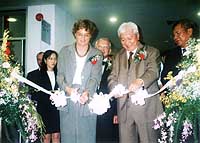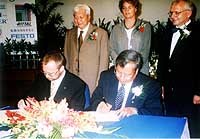- HEADLINES [click on headline to view story]:
-
Enron bankruptcy helps boost good governance in Thailand
-
SET enjoys highest rally in Asia and Oceania
-
Japanese investors showing confidence in Thai economy
-
Thailand-Myanmar set to adopt account trade
-
China and Thailand join in transport and communication development
-
Interest rates likely to fall
-
Export Promotion Dept urged to coordinate lending to exporters
-
Chicken exporters urged to expand market into Russia
-
TGI presents innovative technologies to Thailand’s industrial sector
|
|
Enron bankruptcy helps boost good governance in Thailand
The collapse of Enron, the United States’ giant
energy firm, and criteria adjustment by Calspers, the largest pension fund
in the US, have boosted awareness of the good corporate governance in
Thailand. The Thai Farmer’s Research Center recently reported that the
Enron bankruptcy has shaken up overall business in the US and has sounded
a warning to companies around the world of imminent disaster if they run
businesses without the good corporate governance.
Most business organizations in Thailand are currently
more aware of the importance of good governance as the government has
prioritized the matter in a national agenda. The year 2002 has been
designated the year of government encouragement and more modern approaches
to develop good governance in the nation are being backed.
Apart from the Enron collapse, the adjustment of
investment criteria by California Public Employees’ Retirement System (Calspers)
played a key role in boosting the awareness of the governance. Calspers
placed greater emphasis on the transparency of organization and labor
treatment for its investment decision.
TFRC said it agreed with the government’s move to
give greater importance to the development of good corporate governance
and took the view that the government needs to make comprehensive
packages, including amending laws and improving enforcement of rules. The
think-tank urges the government to seek cooperation and coordination from
the regulations, and provide incentives to promote improved governance in
both public and private organizations. (TNA)
SET enjoys highest rally in Asia and Oceania
The Stock Exchange of Thailand enjoyed the highest
rally in Asia and Oceania last year since the country’s economy signaled
full recovery and performance results of many listed companies improved.
Speaking after a meeting of the Federation of Stock
Exchanges in Asia and Oceania, SET president Kittrat na Ranong said the
data on stock indexes of member countries showed the SET index rallied by
26% in 2001, the highest among the members of the federation. China and
South Korea came second with the stock indexes rising by 20%.
Kittrat explained that the index had previously plunged
to a level lower than it should have and did not have a sustainable rally
since mid-1999 when the county’s economy bottomed out. However, the
economy showed clear signals of recovery last year as many businesses
enjoyed improved performance results.
Kittrat said the chairman of the stock market in Japan
told the meeting that the Japanese economy should make a recovery in
2002-2003 as can be witnessed by the steady rally of Nikkei Stock
Exchange. An economic recovery in Japan would bode well for the economies
and stock markets of countries in East Asia. He said no participants had
expressed concerns about the capital transfer within the stock markets in
Asia as many take the view that capital could flow out of or in to any
country liberally. They said what member countries should do most now is
to seek ways to strengthen their stock markets. (TNA)
Japanese investors showing confidence in Thai economy
Thaksin Shinawatra recently disclosed that Japanese
investors remain confident of the economic growth in Thailand and are
ready to expand investment in the country. In Japanese investors’ view
the economic policy adopted by the Thai government is practicable.
Speaking after a lunch meeting with representatives of
the Economic Organization Federation of Japan he said the Federation has
confidence in the Thai government’s policy and the country’s economic
direction after having monitored the performance during the past year.
The premier reiterated Asian countries need to step up
efforts to join forces to ensure the balance of the global economy. He
said the Japanese investors shared his view and are willing to support
economic cooperation activities. They are also so ready to participate in
the Asia Cooperation Development meeting. The forum is part of initiatives
to encourage Asian countries to cooperate with each other in various
fields. The first meeting will be hosted by Thailand in May-June. (TNA)
Thailand-Myanmar set to adopt account trade
Commerce Minister Dr. Adisa Bodharamik announced that
Thailand and Myanmar will seek ways to boost the trade value of the two
neighboring countries through an account trade. While presiding over the
3rd meeting of the Joint Trade Committee held March 18-19, he said both
countries will cooperate in the sale of rice in overseas markets.
Officials concerned will exchange information for a joint marketing drive
in order to prevent rice prices of the two nations being curbed by
purchasers.
In addition, the committee discussed Thailand-Myanmar
border trade, which currently totals 50 billion baht a year or 50% of the
total trade value of the two countries. It is expected the bilateral
cooperation will help increase the border trade value to 60-70% of the
total value. To this end, he said, strict rules and regulations on border
trade must be eased and the opening of more border passes be encouraged.
Dr Adisa said he and a representative of the Myanmar government will meet
to discuss the expansion of border trade areas soon.
Rangoon currently bans the import of 15 product items
from neighboring countries. They include seasoning powder, drinks,
crackers, canned foods and fruits, noodles, instant noodles and liquors.
The Thai government is asking Myanmar counterparts to ease the rules so
the two countries can exchange a larger variety of products.
At present, Thailand imports soy bean and garlic in
greater amounts from Myanmar. The ministry is also attempting to smooth
out export and import procedures and to prevent the cross-border smuggling
of goods. (TNA)
China and Thailand join in transport and communication development
The People’s Republic of China and Thailand have
agreed to cooperate in the area of transport and communication
development, according to Transport and Communications minister
Wanmuhamadnoor Matha.
The Chinese and Thai governments have agreed to join
hands in all channels - land, sea, and air. Part of the agreement was
Beijing’s decision to deliver 11 vessels to Thailand to be used for
shipments of Thai products to the United States.
“Chinese Prime Minister Zhu Ronji agreed with Premier
Thaksin’s proposal, when the former paid a visit to Thailand in May,
that Beijing send 11 vessels to Thailand to help support shipments of Thai
products to the U.S. market,” Wanmuhamadnoor said.
A ceremony was held recently at Laem Chabang Seaport
for the delivery of China Shipping Group vessels to Thailand.
The Chinese and Thai government have also agreed to
cooperate to expand the development of transport and communications to
cover other countries in the Mekong Sub-region, including Laos, Cambodia,
and Myanmar.
The ceremony was organized at Laem Chabang to launch
the cooperative project between China and Thailand through China Shipping
Group Co. In the future China Shipping Group will provide the 11 vessels
with well-equipped containers to help support shipments of Thai products
to the U.S. and other Western markets. (TNA)
Interest rates likely to fall
Local interest rates are likely to fall further if
liquidity in the system remains excessive due to continued capital inflow,
Chulakorn Singhakowin, chairman of the Thai Bankers’ Association (TBA),
said.
Chulakorn said that lending activities in the banking
system began to increase and more commercial banks were willing to lend.
Therefore, the Bank of Thailand’s officials did not seek banks’
cooperation to accelerate lending at the last meeting with TBA executives
because they felt that commercial banks had already tried to lend more.
However, Chulakorn, who is also president of the Bank
of Asia, said he believed local interest rates would remain unchanged in
the short run. He conceded he did not dare to project which direction the
interest rates would move after longer than one month because rates are
expected to be very volatile from now on. Commercial banks might need to
consider interest changes on a weekly basis.
He said foreign capital continued to flow into the
country, resulting in excessive liquidity remaining unabated. The
situation would definitely lead to another interest cut.
Chulakorn said, “Lending is now distributed in all
business sectors, not converged in a particular one like in the past; the
more the credit amount, the more the loan growth rate. It is expected the
BOT will focus on loan expansion for development of rural areas in the
future. Still, it cannot state clearly the appropriate level of local
interest rates. The decision on interest rate cuts depends on the
liquidity in the system.” (TNA)
Export Promotion Dept urged to coordinate lending to exporters
Deputy Commerce Minister Suvarn Valaisathien recently
stated that the Export Promotion Department should play a role as a
coordinator for exporters who want to seek financial support from
commercial banks and other financial institutions.
After chairing a recent meeting on the export policy,
he suggested the department be designated as the coordinator between
exporters and capital sources so financial institutions could lend to the
exporters without any delay.
The institutions could increase credit amounts and
offer lower lending rates without any concern if the department could help
them find the exporters with good corporate governance.
The Export and Import Bank of Thailand and other
commercial banks currently extend loans to exporters of a limited amount,
therefore the Export Promotion Department must act as an intermediary.
Suvarn said the projected estimate of the country’s
total exports in February was close to those of the same month last year
while total imports dropped by 17%. It resulted in an expected trade
surplus of around US$317 million last month. He said the projected decline
in imports was evidence that the government’s drive to stimulate local
consumption has produced positive results. (TNA)
Chicken exporters urged to expand market into Russia
Russia’s ban on chicken imports from the United
States has given Thailand an opportunity to accelerate expanding exports
of the product into the country, according to a senior official at the
Business Economics Department.
Boonthipa Simasatien, the department’s
director-general, said the Veterinary Affairs Department in Russia has
imposed an import ban on chicken from the US since March 10, reasoning
antibiotics and other chemicals were used in the raising, production and
preservation of chickens. Also, Russia plans to ban imports of pork, beef
and chicken from China and some meat products from Spain and Brazil. As a
result this will provide a good opportunity for local producers and
exporters to export frozen chickens into Russia where the annual
consumption of chicken is 2 million tons, half of which is imported from
the US.
However, trade between Russia and Thailand still has
some difficulties as Thai exporters are uncertain about repayment
prospect. Therefore, the Export-Import Bank of Thailand could play an
important role in helping the exporters ease repayment risks so they might
take this opportunity to expand export markets.
Last year, Thailand’s exports of frozen chicken to
Russia totaled 1,400 tons worth 16.2 million baht or 0.07% of its total
exports. (TNA)
TGI presents innovative technologies to Thailand’s industrial sector
By Sue Malhotra
Communication Consultant - TGI
The Thai-German Institute launched their fourth
successive Innovative Technologies Exhibition at their institute in the
Amata Nakorn industrial estate on April 4 th.
A large turn-out of companies and industrial organizations in Thailand
displayed their products and services at the exhibition. Under the banner:
“Progress and Success by Innovation”, the event started with a
beautiful show planned around the theme “Interpretation of Innovation
and Cooperation”. The performance featured a sequence of Western and
Eastern dances as seen from the olden days leading up to the present which
artistically expressed the message of the theme.
 The
deputy minister of industry, Pichate Satirachaval and the German embassy
first secretary in economic and commercial affairs, Christiane Koenig
opened the exhibition with a ribbon cutting ceremony at the exhibition
hall. The
deputy minister of industry, Pichate Satirachaval and the German embassy
first secretary in economic and commercial affairs, Christiane Koenig
opened the exhibition with a ribbon cutting ceremony at the exhibition
hall.
Following the show, the two directors of TGI, Narong
Ratana and Walter Kretschmar welcomed the dignitaries, guests and
exhibitors and then gave a report outlining the program agenda for the
day. Pichate Satirachaval, deputy minister of industry, delivered the
opening speech. Christiane Koenig, first secretary in economic and
commercial affairs of the embassy of the Federal Republic of Germany then
addressed the participants of the event.
The occasion also celebrated the 2 nd
anniversary of the VDI Exhibition. Cooperation between the VDI, or The
German Association of Engineers, and TGI was formalized by a signing of a
contract between the two parties Dipl-Ing Achim P. Eggert and Narong
Rattana, making TGI the official library for technical information in
technology in production, and traffic and environment.
The morning session ended with the deputy minister of
industry and the German embassy first secretary in economic and commercial
affairs opening the exhibition with a ribbon cutting ceremony at the
exhibition hall where thirty five companies ranging from large
international companies to smaller, local operators and organizations
exhibit their products and services.
After lunch, a series of talks were given in the
Audimax with a special highlight on two novel and exciting technologies.
The first is a new, environmentally friendly technology from German
company ZOXY, makers of long lasting, environmentally friendly zinc/air
fuel cell batteries.
 Cooperation
between The German Association of Engineers and TGI was formalized with a
contract signing between Dipl-Ing Achim P. Eggert and Narong Rattana,
observed by Pichate Satirachaval, deputy minister of industry; Christiane
Koenig, first secretary in economic and commercial affairs of the embassy
of the Federal Republic of Germany and Walter Kretschmar, German director
of TGI. Cooperation
between The German Association of Engineers and TGI was formalized with a
contract signing between Dipl-Ing Achim P. Eggert and Narong Rattana,
observed by Pichate Satirachaval, deputy minister of industry; Christiane
Koenig, first secretary in economic and commercial affairs of the embassy
of the Federal Republic of Germany and Walter Kretschmar, German director
of TGI.
The second session was titled, “Quality Management in
the Rubber and Plastic Industry”, led by Dr. Winfried Kuhn from
Innovative Imaging Corp. Germany, who gave an informative talk about
innovative technology in non-destructive testing of polymer products -
products that are often found in safety-critical systems such as hydraulic
systems in aircraft. The new testing technology uses magnetic resonance
techniques, already widely used in scientific laboratories and hospitals.
TGI’s Hall hosts a new exhibition every six months.
In the course of a typical exhibition, TGI receives as many as 2000
visitors, including national and international delegations from private
companies, government departments and academic establishments.
For information about exhibiting products or services,
contact the TGI marketing department or telephone Wiroj at 038-215033 x
1603.
|
|
|
|
News | Business News | Features | Columns | Letters | Sports | Auto Mania
Kid's Corner | Who’s Who | Travel | Our Community | Dining Out & Entertainment
Social Scene | Classifieds | Community Happenings | Books Music Movies
Club in Pattaya | Sports Round-Up
E-mail: [email protected]
Pattaya Mail Publishing Co., Ltd.
370/7-8 Pattaya Second Road, Pattaya City, Chonburi 20260, Thailand
Tel.66-38 411 240-1, 413 240-1, Fax:66-38 427 596
Copyright © 2002 Pattaya Mail. All rights reserved.
This material may not be published, broadcast, rewritten, or redistributed.
|
|
|
Correction
Pattaya Mail incorrectly
published that Waste Management Siam was a subsidiary of Waste
Management Inc. of the USA. In fact, Modern Asia Environmental
Holding Inc. (MAEH) is the parent company of Waste Management
Siam Limited (WMS), Eastern Seaboard Environmental Complex
Co., Ltd. (ESBEC) and Modern Asia Environmental Limited (MAE).
The main shareholder is the Global Environment Fund, a private
equity fund from Washington D.C. Waste Management Inc. of the
USA has no ownership in any of these companies or
subsidiaries. |
|

 The
deputy minister of industry, Pichate Satirachaval and the German embassy
first secretary in economic and commercial affairs, Christiane Koenig
opened the exhibition with a ribbon cutting ceremony at the exhibition
hall.
The
deputy minister of industry, Pichate Satirachaval and the German embassy
first secretary in economic and commercial affairs, Christiane Koenig
opened the exhibition with a ribbon cutting ceremony at the exhibition
hall. Cooperation
between The German Association of Engineers and TGI was formalized with a
contract signing between Dipl-Ing Achim P. Eggert and Narong Rattana,
observed by Pichate Satirachaval, deputy minister of industry; Christiane
Koenig, first secretary in economic and commercial affairs of the embassy
of the Federal Republic of Germany and Walter Kretschmar, German director
of TGI.
Cooperation
between The German Association of Engineers and TGI was formalized with a
contract signing between Dipl-Ing Achim P. Eggert and Narong Rattana,
observed by Pichate Satirachaval, deputy minister of industry; Christiane
Koenig, first secretary in economic and commercial affairs of the embassy
of the Federal Republic of Germany and Walter Kretschmar, German director
of TGI.